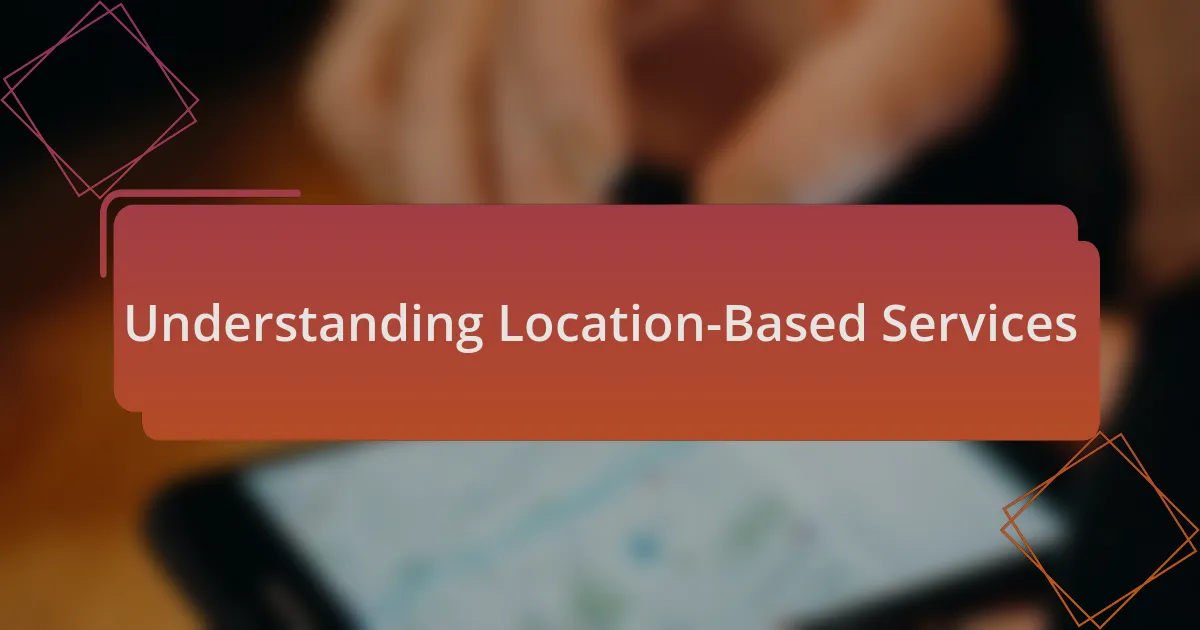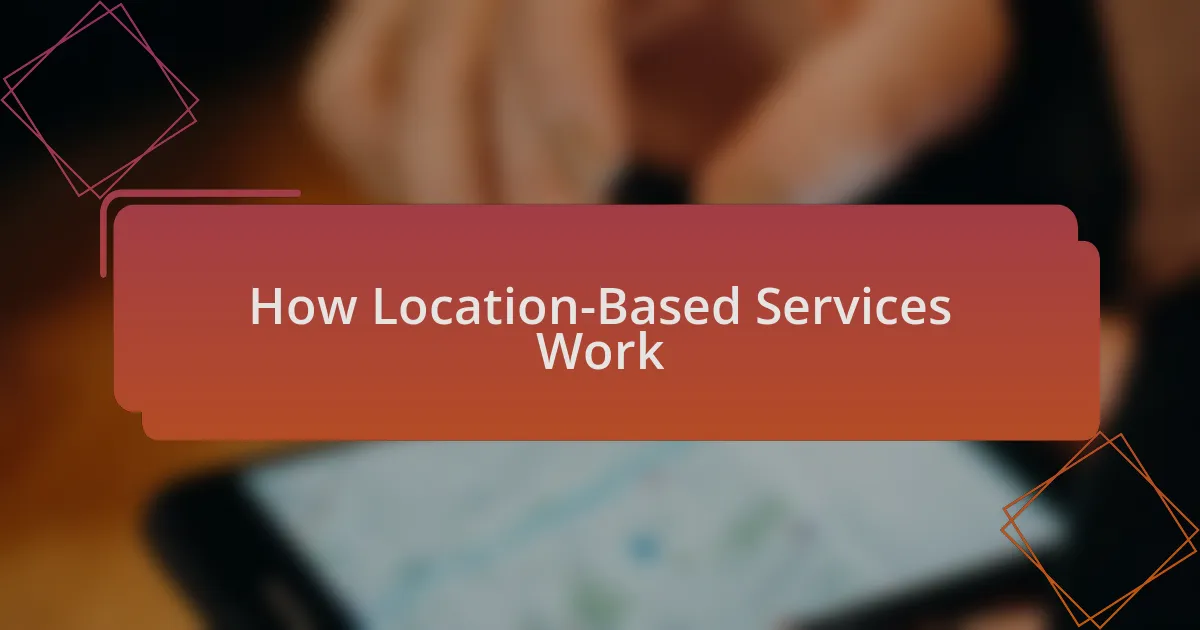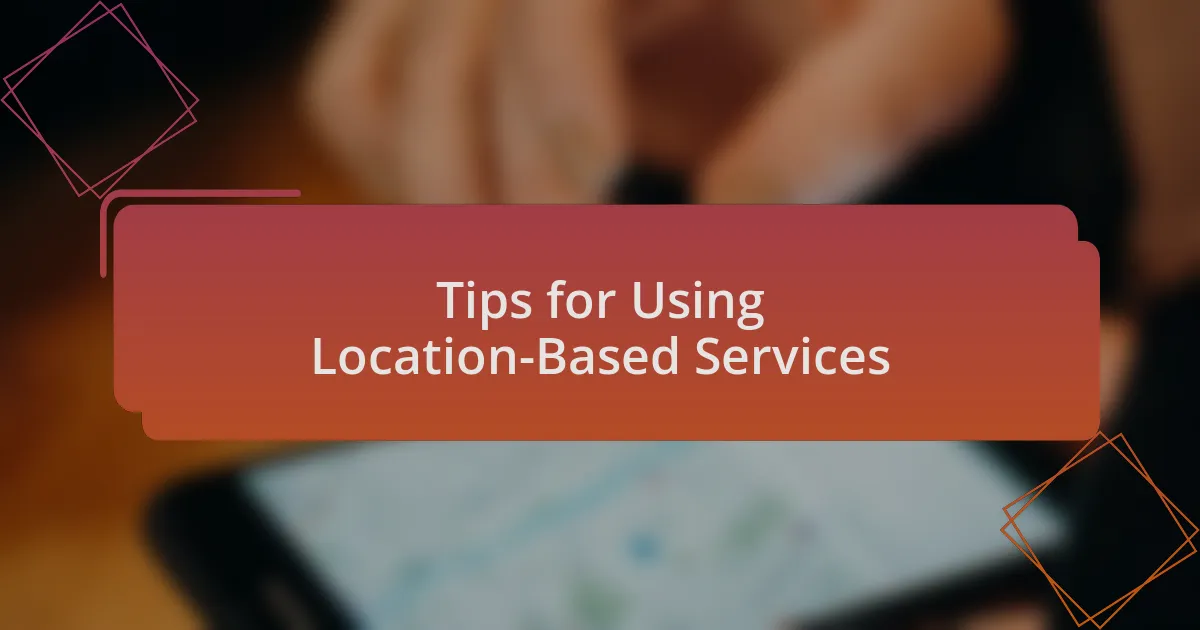Key takeaways:
- Location-based services (LBS) utilize GPS technology to provide tailored information based on users’ geographic locations, enhancing convenience and local experiences.
- Local search engines empower small businesses by facilitating real-time interaction with consumers, fostering a strong community spirit.
- LBS analyze data from various sources to deliver personalized recommendations, influencing consumer decisions and habits.
- Users should prioritize privacy, selectively use alerts, and view LBS as tools for exploration rather than solely relying on them.

Understanding Location-Based Services
Location-based services (LBS) leverage the power of GPS technology to provide users with tailored information and services based on their geographic location. I remember the first time I used a location-based app to find a nearby coffee shop; it felt almost magical how quickly I was directed to my favorite spot, highlighting the convenience LBS offers in our busy lives. Can you think of how often you rely on your smartphone for directions, or to discover local attractions?
As I explored various LBS applications, I discovered they vary widely—from navigation aids to personalized marketing campaigns. It struck me how these services not only guide our movements but also influence our purchasing decisions. Aren’t you curious about how local businesses utilize this technology to reach you just when you need them most?
Moreover, there’s an emotional layer to location-based services that often goes unrecognized. I’ve felt a sense of belonging when discovering hidden gems in my neighborhood through an app suggestion. It makes you wonder: how does knowing what’s nearby enhance our connection to the places we inhabit? Understanding LBS is not just about technology; it’s about enhancing how we experience our environment.

Importance of Local Search Engines
Local search engines play a crucial role in bridging the gap between consumers and businesses in a geographically specific context. I remember searching for a local bakery for a last-minute birthday cake; the search engine not only provided options but also customer reviews and directions, making my choice effortless. It’s fascinating how a simple search can turn an ordinary day into a delightful experience filled with sweet surprises.
The impact of local search engines extends beyond convenience; they empower small businesses to thrive in their communities. When I started my own venture, utilizing local SEO strategies allowed me to connect with customers who genuinely valued what I offered. This real-time interaction fosters a community spirit, prompting the question: how would businesses survive without this vital, localized online presence?
I’ve often pondered how local search engines shape our consumer habits and preferences. For instance, when I stumbled upon a locally-owned bookstore through a search, I not only found a place to buy my next read but also felt a sense of pride supporting a business in my neighborhood. Can you recall a similar instance where your search led to a deeper connection within your local community?

How Location-Based Services Work
Location-based services work by leveraging various technologies to pinpoint a user’s geographic location and deliver information relevant to that location. For example, GPS, Wi-Fi positioning, and cellular data allow apps to identify where a person is in real-time. I remember vividly when my navigation app guided me to a nearby coffee shop while I was wandering in a new city; it felt like having a personal tour guide in my pocket.
The magic of location-based services comes from their ability to analyze data not just from the user, but also from the environment around them. This means that businesses can push notifications or advertisements precisely when a potential customer is nearby. I once received a tempting discount alert from a clothing store just as I walked past it; it was an enticing nudge that turned casual browsing into an impulse buy. Can we deny how effective these services can be in steering our decisions?
Additionally, the integration of user preferences and location history enhances the personalization of recommendations. By learning from previous searches and interactions, these services can suggest places that align with one’s tastes. For instance, after I frequently searched for vegan restaurants, my app started highlighting similar options, thus enriching my dining experiences. Isn’t it remarkable how technology tailors our choices, turning a mundane decision into something more aligned with our individuality?

Tips for Using Location-Based Services
When using location-based services, it’s crucial to keep your privacy in mind. I always review the permissions an app requests before I hit that install button. After all, do I really need an app to know my exact whereabouts at all times? I prefer to limit sharing my location to only those services I genuinely trust.
Another tip is to take advantage of alerts and notifications but be selective about them. I once turned on location alerts for a food delivery service, and honestly, I started getting notifications at the most inconvenient times. Since then, I’ve only enabled alerts that offer genuine value, such as special promotions or nearby events I would actually attend. Finding the right balance can enhance the experience without overwhelming you.
Lastly, always use these services as a tool, not a crutch. I remember a road trip where I relied heavily on a navigation app, but I missed the joy of exploring hidden gems off the beaten path. Sometimes, the best stories come from those spontaneous detours. Have you ever stumbled upon a fabulous little spot just by wandering? It’s those unexpected discoveries that often make for the best memories.